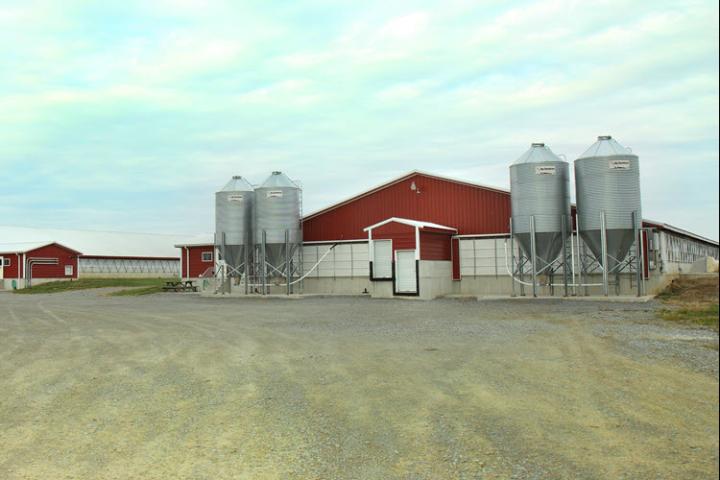Benefits and Challenges to Raising Contract Livestock

AgCredit offers financial assistance to current and future borrowers interested in constructing contract livestock and poultry facilities in Northwest and Northcentral Ohio. Contract livestock production can include hogs, broilers, turkeys or other animals to help diversify your operation.
Below are some of the benefits – and potential challenges – that come with building and maintaining contract barns to help you decide what best suits your needs.
The Benefits
Diversifies your operation
A huge benefit of building your own contract livestock barn is that it introduces a new income source. Diversification opens previously untapped revenue streams, including those that may have a higher market demand or better price stability. It also creates new opportunities to add family members to your business or solidify your financial standing. Nathan Schroeder of FNK Farms was able to expand his business by adding a trucking service and now sells hog manure as fertilizer. When describing his new hog manure business, Nathan shared: “It’s a great source to use on your own farm, and any excess that you have is a great commodity to sell.”
You own your barn, building equity
Another positive of building your own contract barn is that you get to run your own livestock facility. This business model encourages farmers to own their facilities and earn money by caring for animals. Owning your barn offsets initial operating costs, which can significantly impact your bottom line. You are also building equity – another important benefit – if you finance and build a contracted barn. It is a proven option that can benefit any crop farmer or landowner.
Mitigate risk by working with an integrator
Working with an integrator helps reduce your risk as a contract livestock farmer. Contract barns offer financial stability by providing a guaranteed market for products with predetermined pricing, reducing your vulnerability to market fluctuations. Depending on who you work with, some integrators also provide health support and feed for the animals, leaving farmers to tend to their livestock. This is an advantage and something to be considered before diving into contract farming.
The Challenges
Barn and equipment maintenance
Maintaining your own livestock barn and associated equipment presents its own challenges. While contracting certainly reduces some operational risk, you should plan to have a budget to handle unexpected fixes and upgrades. Phil Hord, director of sow production and research and innovation at Hord Family Farms, says he learned, through personal experience, that pigs are very curious animals and, if not properly contained, can damage equipment or even your barn! So, keeping up on maintenance is very important.
Animal health
Animals can get sick from time to time. When livestock healthcare issues surface, integrators often offer support and can help farmers work through them. However, there can be unaligned expectations – so make sure all agreements about animal health responsibilities are in writing before committing.
Time investment
It takes considerable time to feed and care for growing animals– and whether or not you have enough of it is something to consider before securing financing to build a hog or poultry barn. Phil Hord with Hord Family Farms offers this piece of advice: “As long as you have the right things in place, and the right mentality of why you’re doing it and how you’re going to feasibly do it, it can be an awesome way for families to add things to their farm.”
If you are looking to build or purchase a contract barn, please contact your local AgCredit office to learn more about available financing options to help get you started.
To learn more about contract hog barns, be sure to tune into the AgCredit Said It podcast and listen to Episodes 21 and 45. Our hosts chat with Phil Hord, an integrator with Hord Family Farms, in Episode 21 and, in Episode 45, with Nathan Schroeder of FNK Farms – the owner of a contract hog barn.